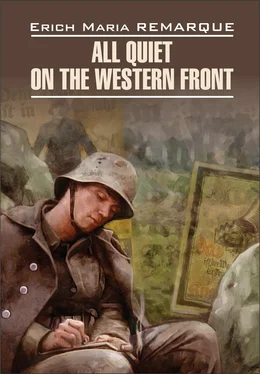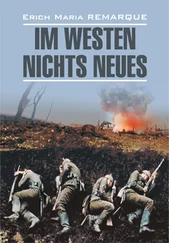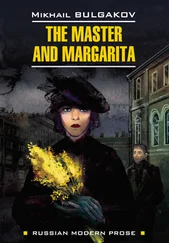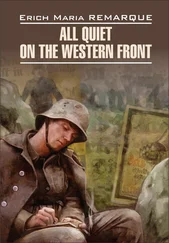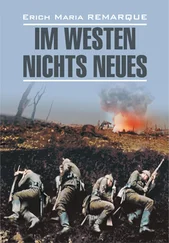I don’t say anything about the dead printer.
It’s not until the following morning that I find I can’t hold out any longer. I have to tell Kat and Albert. They both calm me down. ‘You can’t do anything about it. What else could you do? That’s why you’re out here.’
I listen to them, comforted, feeling better because of their presence. What sort of rubbish did I dream up in that shell hole?
‘Have a look at that,’ says Kat, and points.
There are some snipers standing on the parapet. Their rifles have telescopic sights and they are keeping an eye on the sector facing our trench. Every so often a shot rings out.
Then we hear shouts – ‘That was a hit!’ ‘Did you see how high he jumped?’ Sergeant Oellrich turns around proudly and notes his score. He is in the lead in today’s shooting fist with three direct hits confirmed as certain.
‘What do you think of that?’ asks Kat.
I nod.
‘If he goes on that way he’ll have another sharpshooter’s badge by this evening,’ reckons Kropp.
‘Or he’ll soon be promoted to staff sergeant,’ adds Kat.
We look at each other.
‘I wouldn’t do it,’ I say.
‘All the same,’ says Kat, ‘it’s a good idea for you to watch him just now.’
Sergeant Oellrich goes back to the fire-step. The end of his rifle moves this way and that.
‘You don’t need to waste another thought on that business of yours,’ nods Albert.
I can’t even understand it myself any more.
‘It was just because I had to stay there with him for such a long time,’ I say. ‘After all, war is war.’
There is a short, dry crack from Oellrich’s rifle.
We’ve landed a good job. Eight of us have been detailed to guard a village that has been evacuated because it had been under such heavy shelling.
Our main task is to keep an eye on the supply dump, which hasn’t been emptied yet. We have to draw our own supplies from what’s left there. And we are just the men for the job – Kat, Albert, Muller, Tjaden, Leer, Detering – the whole group of us is there. Mind you, Haie is dead. But even so we’ve been amazingly lucky, because the other squads have had far more losses than we have.
We pick a concrete cellar [234] concrete cellar – бетонированный подвал
to use as a dugout, with a stairway leading down to it from outside. In addition, the entrance is protected by a separate concrete wall.
Now we really get busy. This is a chance not only to stretch our legs but also to give our souls a bit of breathing space. And we make the most of chances like this, because our situation is too desperate for us to waste much time on sentiment. Sentimental thoughts are only possible as long as things are not absolutely awful. But we don’t have any choice except to be pragmatic. So pragmatic, in fact, that I sometimes shudder when, just for a moment, an idea strays into my head from the old days before the war. But thoughts like that never stay with me for long.
We have to take our situation as lightly as we can. That’s why we seize every opportunity, and why terror finishes up cheek by jowl with tomfoolery, in stark juxtaposition and without any midway stage. We can’t help it, we just throw ourselves into it.
Here, too, we work like mad to create a paradise, a paradise, needless to say, of guzzling and sleeping.
First of all we fit the place out with mattresses that we drag over from the houses. Even a soldier’s bottom enjoys something soft to sit on for a change. The floor in the middle of the room is the only place we leave empty. Then we go and find ourselves bedcovers and quilts, wonderfully soft affairs. There’s plenty of everything in the village. Albert and I find a mahogany four-poster that can be taken apart – it has a blue silk canopy and a lace coverlet. We sweat like pigs shifting it, but you just can’t pass up a thing like that, when it is sure to be shot to bits in a day or so anyway.
Kat and I go for a little patrol through the houses. In a very short time we have found a dozen eggs and a couple of pounds of fairly fresh butter. In one of the rooms there is a sudden loud noise and an iron stove comes hurtling past us through the wall and then out through the opposite wall a few feet from where we are. Two holes. It’s from the house opposite, which a shell has just hit.
‘Lucky again,’ grins Kat, and we carry on foraging. All of a sudden we prick up our ears and then dash off. And within minutes we are standing in wide-eyed enchantment; there, running about in a little pigsty are two live piglets. We rub our eyes and then risk another cautious look: they are really and truly still there. We grab hold of them – there’s no doubt about it, they are two genuine little pigs.
They will make a magnificent meal. No more than a few dozen yards from our dugout there is a small house that used to serve as officers’ quarters. In the kitchen is a massive cooking range with two gridirons, pots, pans and kettles. It is all there, there is even a shed full of ready-chopped firewood – a regular Aladdin’s cave.
Two men have been out since morning in the fields looking for potatoes, carrots and peas. We are very particular, and will have nothing to do with the canned stuff from the supply depot – we want fresh vegetables. There are already two cauliflowers in the pantry.
The piglets have been slaughtered. Kat saw to that. We decide to have potato pancakes with the roast. But we can’t find anything to grate the potatoes with. However, we soon find a way round it. With some nails we punch a good number of holes into tin fids – and hey presto they are graters! Three men put on heavy-duty gloves to protect their fingers when they are grating, two more peel the potatoes and we’re well on our way.
Kat takes charge of the piglets, the carrots, the peas and the cauliflower. He even makes a white sauce for the cauliflower. I cook the potato pancakes, four at a time. Within ten minutes I’ve got the knack of tossing them so that when the pancakes have been cooked on one side they will fly up into the air and turn over, so I can catch them again in the pan. The pigs are being roasted whole. Everything is arranged around them as if they were on an altar.
Meanwhile some visitors have arrived, a couple of W/T operators [235] W/T operator = wireless telegraphy operator – оператор беспроводной связи (радиотелеграфии)
, whom generously we invite to the meal. They sit in the living room, where there is a piano. One plays and the other one sings a folk song from Saxony [236] Saxony – Саксония (королевство в составе Германской империи с 1870 по 1918 гг.)
. He sings it with great feeling, but with quite a strong regional accent. For all that, we are caught up by the mood as we stand there by the stove preparing all the good things.
Gradually we notice that we are coming in for a bit of a pasting. The observation balloons have spotted the smoke from our chimney and we’re coming under fire. It’s those bloody daisy-cutters, the little shells that make a small hole and scatter fragments low and wide. The whistling gets closer and closer around us, but we can’t possibly abandon the food. The bastards are getting our range. A few bits of shrapnel whizz through the kitchen window. The roasts are nearly ready, but cooking the potato pancakes is more of a problem. The impacts are so close together now that shrapnel is hitting the wall of the house more and more often, and coming in through the windows. Every time I hear the whistle of one of the things coming over, I duck down by the window wall with my frying pan and the pancakes. Then I straighten up again and carry on cooking.
Читать дальше
Конец ознакомительного отрывка
Купить книгу
